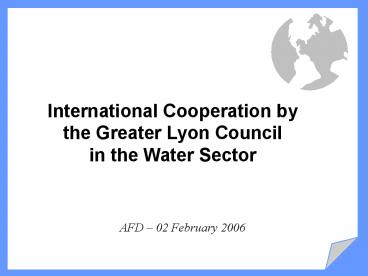Coop dec Liban - PowerPoint PPT Presentation
1 / 12
Title:
Coop dec Liban
Description:
To contribute to reaching the Millennium Development Goals : ... Burkina Faso (Komsilga, Boura) Drinking water boreholes. Morocco (Tanger, Tarroundant) ... – PowerPoint PPT presentation
Number of Views:53
Avg rating:3.0/5.0
Title: Coop dec Liban
1
International Cooperation by the Greater Lyon
Councilin the Water Sector
AFD 02 February 2006
2
I. International actions by the water department
- To contribute to reaching the Millennium
Development Goals - by 2015, halve the number of people in the world
without access to safe water - How?
- by providing funding to develop local
infrastructure - by sharing our experience to reinforce local
management structures
3
I. International actions by the water department
- A new legal framework The Oudin Law (2005)
- Local authorities responsible for providing
public water and sanitation services can dedicate
up to 1 of their water budget to decentralized
co-operation, emergency aid or international
solidarity actions in the field of water and
sanitation.
4
I. International actions by the water department
- Specific Budgets
- From 2006 0.4 of water and sanitation
revenues, i.e. nearly 500 000 / year used for
two distinct types of action - Capacity building in partner towns via
decentralized cooperation programs (200 000) - Financing of infrastructure via an International
Solidarity Fund for Water (300 000)
5
II. The Solidarity Fund for Water
- Creation in 2003 of a Fund fed by equal
contributions by the Véolia and the Grand Lyon
(Greater Lyon Council), with an upper limit of
300 000 euros / year. - Objectives To develop the infrastructure
providing access to water and sanitation. - To finance projects led by local NGOs (funding
agreements)
6
II. The Solidarity Fund for Water
- A steering committee
- Defines strategic orientations
- Validates funding agreements
- A Technical committee
- Selects the projects to be financed according to
specific criteria effective needs, technical
pertinence, sustainability etc. - Monitors and assesses project implementation and
use of funds.
7
II. The Solidarity Fund for Water
- Projects in 2005
- Madagascar (Fianarantsoa, Mahajunga) Drinking
water and sanitation systems - Burkina Faso (Komsilga, Boura) Drinking water
boreholes - Morocco (Tanger, Tarroundant) Drinking water
connections and sanitation network for schools - Moldavia (town of Balti) Restoration of networks
8
III. Decentralized cooperation programs
- Background
- 1999 signing of the first decentralized
cooperation agreement on water with the Water
Offices of Beirut - 2003 extension of the cooperation agreement to
three other water establishments - 2006 beginning of cooperation with Madagascar
9
III. Decentralized cooperation programs
- Legal Framework
- Decentralized cooperation agreement signed
between the water department and a foreign local
authority responsible for public water services. - Objectifs
- To reinforce the capacities of the public water
services to improve the quality of services
provided to the users.
10
III. Decentralized cooperation programs
- Resources
- Political management of programs by the water VP
- Implementation of programs managed by the Water
Department - Exchange of experience, training and technical
support provided by employees of the water
department. - Missions in the field and visits in Lyon
- Presence of a permanent representative in the
field to coordinate the program locally.
11
III. Decentralized cooperation programs
- Principles underlying actions
- Ensure that projects are appropriated by local
partners principle of partnership, not direct
financing, exchange rather than knowledge
transfer, long-term relationships. - Mobilize a network of players, act in agreement
- Find complementarity with bilateral cooperation
- Capitalize on lessons learned
12
III. Decentralized cooperation programs
- Programs underway
- LEBANON Support in capacity building of
Lebanese public water establishments - MADAGASCAR Building the capacities of public
water players and application of Madagascars
water code in the Fianarantsoa region. - Project accepted for financing by the European
Unions WaterFacility - and occasional interventions by the water
department in programs run by other departments
of the Greater Lyon Council.
-gt Maximum three programs.































